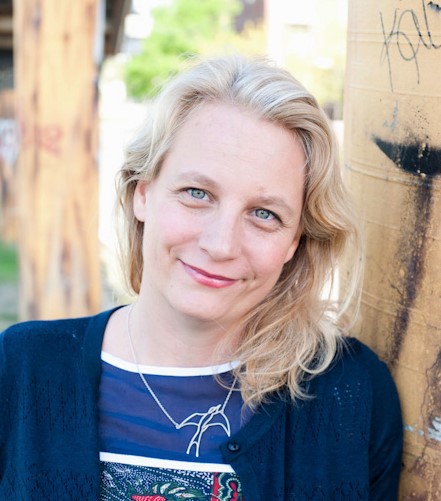By Michael Scoular (The Cascade) – Email
Print Edition: April 8, 2015
Emily Pohl-Weary’s first novel, A Girl Like Sugar, was published in 2004, though an excerpt made its way into an anthology as early as 2001. In young adult fiction years, that’s enough separation for a reading today to conjure up not quite nostalgia, but a sense of how every era’s pop-culture-fixated fiction, believing itself to be modern, becomes a marker of the past almost immediately. The protagonist, Sugar, works at Record Teen, then Alt Video; she plays and re-plays Josie and the Pussycats, Buffy the Vampire Slayer, and the Cure before growing into an ambition of making DV camcorder documentaries and Dogme 95-influenced fiction, beginning with a screening of Lukas Moodysson’s Fucking Åmål. This pursuit takes the novel, in its final pages, to Vancouver, but it’s a city glanced at cursorially: the location of police brutality at the 1997 APEC protests, then a series of tourist sights (“Granville Market, Stanley Park, and some radical bookstore on East Hastings Street called Spartacus Books”) mostly ignored by Sugar because she’s more interested in writing a screenplay. For Pohl-Weary, Vancouver would have appeared as a destination: her entire career to date has been based in Toronto.
“Toronto is where I grew up and have lived my entire life,” she says. “I currently live maybe fifteen blocks from the house where I grew up. So this is a huge change for me. I wanted to see what B.C. was like.”
Pohl-Weary is finishing her semester as UFV’s writer-in-residence, a fellowship that has brought writers, including Richard Van Camp and Elizabeth Bachinsky in past years, to the Fraser Valley each January. During her stay, Pohl-Weary visited local poetry groups, organized public readings and workshops, released her second poetry collection, wrote the foreword to UFV’s annual student creative writing magazine, and, in a new role for the writer-in-residence, taught an undergraduate English course.
“We covered drama, fiction, and poetry in one class, so it was a big overview of the three forms, and the students all got to try writing in each of the genres,” Pohl-Weary says. “I think the most exciting thing for me [is] when I get to bring in stuff that makes a young person think, ‘Oh, this is what poetry can be!’ ‘Oh, this is what a play or a screenplay can be — it can be about my experiences and my life and it can reflect things that I know.’ It doesn’t have to be … what we’re exposed to in high school.”
While the teaching split her week in two, Pohl-Weary says she was able to get some writing done during her stay, both for her new novel and her PhD, which she says is on “creative writing programs as community development: the importance of bringing in new voices, diverse voices, into the Canadian literary canon.”
Being new to the area, the Fraser Valley’s natural, almost secluded environment, often defined in relation to Vancouver, was particularly striking to Pohl-Weary.
“The Literatures of the Fraser Valley conference really opened my eyes to the range of voices in the area,” she says. “I think it’s really exciting, and it’s such a beautiful, natural backdrop.”
And she says she hopes students see how important geography can be to the worlds one puts down in writing.
“There’s no views like the view of those mountains in Toronto — you know, the skyscrapers block out the sun, so I just really hope you guys really understand and appreciate the beauty and the uniqueness of the region,” she says. “I hope to see those things reflected in writing. One of the things I heard at the conference was that people don’t often write about the region. They live here, but they’ll write about other places.
“And that’s such a shame, because how are we to widen what we think of as a Canadian literary canon if we don’t put in places that aren’t Toronto and Vancouver in literature?”
Pohl-Weary is finishing up the semester’s teaching, then has two residencies lined up (in Yukon, then Ontario). This is, she says, the first year she’s tried applying for residencies.
“I was at a place in my life where I thought I would like to see different parts of the country and just get to know something outside my twenty-square box in Toronto,” she says. In the Fraser Valley, Pohl-Weary says she found a region that’s “at a really exciting place,” based on what she’s seen meeting students and the community.
“It’s a great thing to see. I hope that passion doesn’t go away, you know?”


